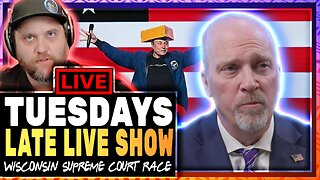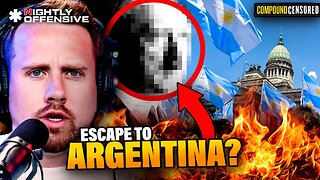Premium Only Content

Leaving the Message Episode 2 - The Rapture of the Elite
The cult following of William Branham is a doomsday cult. What is a doomsday cult? There are two main criteria used to define a doomsday cult, and those criteria are common among all doomsday cults. 1) A doomsday cult will present theology or ideologies with final destruction as their basis and 2) the doomsday cult will offer a means to escape that final destruction to their members.
When the infamous Jim Jones of Peoples Temple convinced almost a thousand people to commit mass suicide with cyanide-laced Kool-Aid, the word "cult" was given new meaning. Defined in simple terms, a "cult" is simply a small group of people with a common set of beliefs, usually led by the person or persons advocating for those beliefs. The early Christians were the "cult following of Jesus Christ". After the Jonestown Massacre, however, people in the modern era suddenly recognized the fact that cults could be dangerous. November 18, 1978, was the infamous "doomsday" for many members of the Peoples Temple cult, but Peoples Temple itself did not necessarily meet the criteria of a "doomsday cult" leading up to 1978. Research suggests, however, that while Jim Jones was working with William Branham and Joseph Mattsson-Boze, Jones was involved in a doomsday cult that may have influenced the Massacre. Multiple sources, including Jones' own handwriting, confirm that Jones was a leader in Branham's "Message" cult.
A "doomsday cult" is a group of people following a central figure who is intently focused upon the End of Days, usually one involving very frightening destruction. doomsday cult leaders often predict a specific date on which they declare the world will come to an end, but the date itself is not the reason their following is considered a doomsday cult; the predicted timeline is only an attribute of a doomsday cult. It is the result of the doomsday focus over time. When the central figure begins to realize that members of their have doubts concerning the doomsday focus, they must have an answer. To keep members interested in their doomsday focus, especially after years of maintaining that focus, leaders of a doomsday cult give members an incentive to continue. "Stay with me, and you will see that on this date in the future, the world will end". Members are held captive until that date. After the doomsday prediction has failed, the group either disbands or the cult leader presents a new date of destruction. William Branham was most famously recognized for his 1977 doomsday prediction, but 1977 was just the result of several other failed predictions given by Branham and leaders in the Post WWII Healing Revival. If the articles in Branham's Voice of Healing publication and newspaper advertisements are any indication, Branham's "doomsday message" was widely popular among the revivalists. Why? Branham claimed to have been informed of this doomsday by God himself, and he was the leader of the Revival. The other criteria that distinguish a doomsday cult from other cults of personality are various means to escape. If there is a doomsday, and the central figure has a direct channel to God, then they must also have the answer as to how to avoid the doomsday scenario they present. In the case of William Branham's "Message" cult following, this means of escape was defined by his "Rapture Theology".
William Branham taught the "Pre-Tribulation Rapture" doctrine, which was very popular among many of his Pentecostal and Fundamentalist supporters. This was the idea that before his doomsday scenario occurred, the Great Tribulation of Mark 13:19 would occur, before which time his cult following would be raptured to heaven. With the exception of Branham's alterations to the Bible text and doomsday predictions, this doctrine was nothing new. Many Christians, both in Branham's era and today, believe in a Pre-Tribulation Rapture. There are also many who do not, citing verses from the Bible that are in disagreement with this doctrine such as John 17:15: "I pray not that thou shouldest take them out of the world, but that thou shouldest keep them from the evil."
The difference between Branham's "Rapture Theology" and that of other supporters of the Pre-Tribulation Rapture theology is one of the primary reasons that Branham's "Message" cult following turned destructive. In the early years of the Healing Revival, Branham claimed that churches who did not participate with the Revival had become apostates and that the Body of Christ (Christians) had been severed. Over time, as churches began to notice the corruption and unscriptural doctrines being introduced, they left the movement and also became "apostate". As a result, when Branham introduced his Rapture Theology, he introduced the notion that only his cult would be raptured before the Great Tribulation -- while all other Christians would suffer the consequences.
The problem? Branham altered multiple passages from the Bible to support this theology. Worse, he added to the Gospel itself. No longer was "faith in Jesus Christ" alone required, to bypass Branham's doomsday scenario and Tribulation, "faith in Jesus Christ and believe in Branham's doctrines" were now both required.
William Branham changed the Biblical narrative to say that Noah represented the apostate Church, and was unrighteous -- disagreeing with Genesis 6:9. He claimed that Enoch represented members of the "Message" (which he called "the Bride"). Then, he disagreed with Genesis 5:23's account of Enoch's 365 years on earth. According to Branham, the Bible was incorrect, and Enoch instead lived 500 years on earth to be a contemporary of Noah. Since his version of Noah had been changed to "unrighteous" instead of "righteous", Branham could then compare his prediction of doomsday and his sect's escape to the Biblical Great Flood.
Members of "The Message" are asked to believe that William Branham's recordings are the "Spoken Word", which supersedes the "Written Word" (The Bible). This becomes extremely dangerous in cases where sects based on Branham's "Message" cult produce their own central figure. Jim Jones, for example, also began claiming that his words were the "Spoken Word". But with regards to Christianity, it raises a very important question. Christians believe that Jesus Christ was the Word made flesh (John 1:14) and that the "Written Word") (The Bible) was how we understand Jesus. Branham, in many instances, disagreed with the "Written Word", claiming his own words were an authority by literally saying, "I am God's Voice to you".
Can William Branham's alterations, which are to meant to replace the Bible, be viewed as Christianity, or the "Followers of Christ"? If Branham's voice was truly the "Voice of God", wouldn't that voice be consistent and not need to alter or update passages of the Christian Bible?
-
 2:22:54
2:22:54
Badlands Media
11 hours agoBad Friends Ep. 1: In the Beginning Was the Word... and a Lot of Chaos
63.6K48 -
 2:57:33
2:57:33
TimcastIRL
8 hours agoFBI CAUGHT Rigging 2020 Election, Leaked Chat Logs PROVE COVER UP w/Michael Malice | Timcast IRL
239K185 -
 2:30:03
2:30:03
The Quartering
8 hours agoWisconsin Supreme Court Race RESULTS Brad Schimel Vs Susan Crawford!
104K46 -
 1:53:02
1:53:02
Laura Loomer
10 hours agoEP113: Canada's CCP Pipeline EXPOSED
73.6K32 -
 2:47:33
2:47:33
Clenzd Gaming
7 hours ago $2.28 earnedRanked redemption! Christ is King!
31.7K1 -
 1:29:23
1:29:23
Slightly Offensive
9 hours ago $15.68 earnedTop Secret CIA Docs LEAKED Showing the Austrian Painter SURVIVED | Nightly Offensive
62.5K43 -
 4:03:55
4:03:55
Saycred Angel Live
8 hours ago!JEEP🔥LET'S TURN THIS TUESDAY UP🔥!TANGIA #RUMBLETAKEOVER
40.7K -
 15:53
15:53
Producer Michael
12 hours agoWHY I MOVED TO LAS VEGAS! (CALIFORNIA IS DOOMED)
73.1K11 -
 9:05:08
9:05:08
Dabkillah
13 hours ago🔴LIVE-DABKILLAH-For The BEST CHAT and ok gaming lol
62.8K1 -
 4:15:17
4:15:17
Foaly's Pub
9 hours ago $3.68 earnedFOALY'S PUB GAME DEN #768(HALO INFINITE #175)
44.9K1